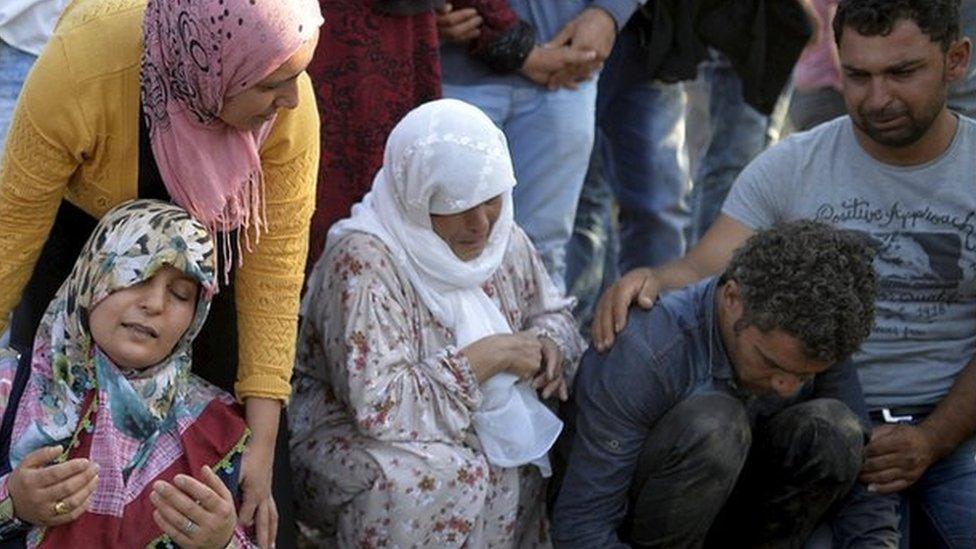Ankara bombing: Who is behind Turkey's deadliest attack?
- Published
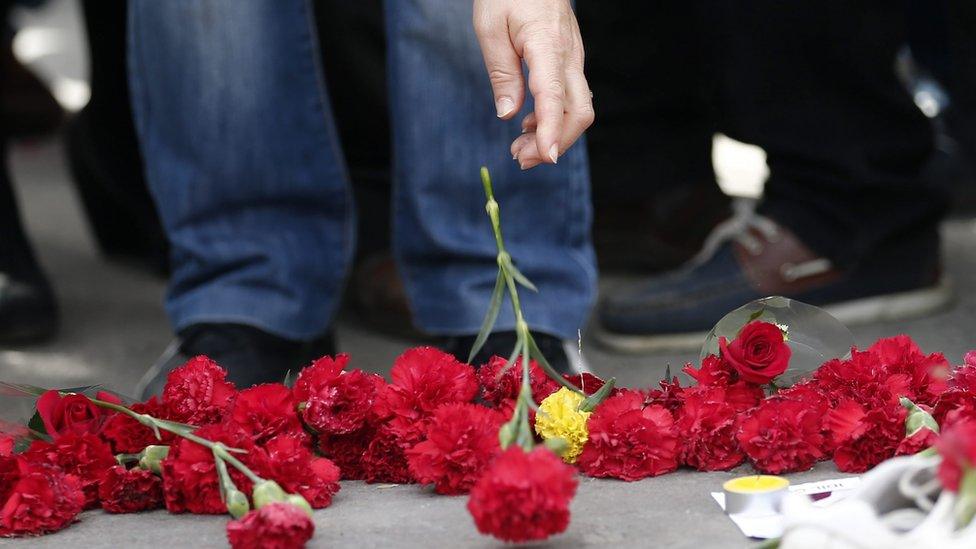
Turkey says Islamic State is the prime suspect in the Ankara bombing
Saturday's twin bombing in Ankara has widened divisions in an already deeply polarised country.
Turkey's Prime Minister Ahmet Davutoglu has singled out the Islamic State (IS) group as the prime suspect, despite earlier saying that three other banned organisations could be responsible.
Meanwhile, opposition HDP party leader Selahattin Demirtas has said the government has "blood on its hands". The BBC assesses the claims.

Islamic State
The Haberturk newspaper reported police sources as saying the type of explosive and the choice of target pointed to a group within Islamic State, known as the 'Adiyaman ones' - referring to Adiyaman province in south-eastern Turkey.
If IS does prove to be responsible, it may have achieved two goals in one strike.
One aim will have been to hurt the Kurds, as Kurdish forces are fighting IS in both Syria and Iraq.
The other goal will have been to hurt the Turkish government, which recently agreed to let US fighter aircraft use its strategically-located Incirlik airbase to launch bombing raids on IS territory in Syria and Iraq.
Turkey, which has also launched its own strikes on IS, is reported to have tightened control over its border with Syria, making it harder for IS fighters to cross. It has also arrested hundreds of IS sympathisers on its own soil.

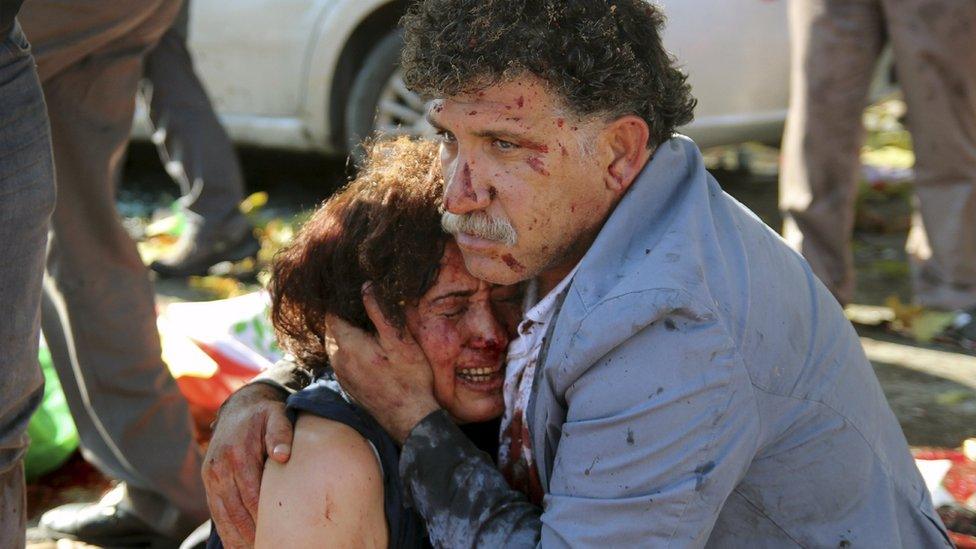
Ankara bombings: Read more
"This is the worst scene I've ever seen" - Shock and anger in Ankara as mourning begins
Who are the Kurds? - The long history of the Middle East's fourth-largest ethnic group
Turkey v Islamic State v the Kurds - What's going on?
What is 'Islamic State'? - A profile of the militant group

There has been no claim of responsibility by IS, although a social media account known to be sympathetic to the group was quick to praise the bombings.
However, IS also did not claim responsibility for a deadly bombing near the Syrian border in July - though the Turkish authorities later blamed it on the group.
The attack in Suruc killed more than 30 youth activists who were discussing rebuilding the neighbouring Syrian Kurdish town of Kobane. A 20-year-old Turkish citizen, an ethnic Kurd from Adiyaman who reportedly had links to IS, was identified as the suspect.
Turkey has been accused of tacit support for IS, viewing it as a useful counterbalance to Kurdish ambitions in the region.

Kurdistan Workers' Party (PKK)
Speaking in the immediate aftermath of the Ankara bombing, Mr Davutoglu named the PKK among four organisations that he said had the capacity to mount such an attack.
Some Turkish MPs were quick to point the finger, arguing that whichever group stood to gain the most from the bombing was likely to have perpetrated it.
However, many observers say the group would be unlikely to bomb a rally attended by many supporters of the pro-Kurdish HDP party.
The PKK launched an armed struggle against the Turkish government in 1984, but called a ceasefire in 2013, with its jailed leader Abdullah Ocalan urging his forces to withdraw from Turkey.
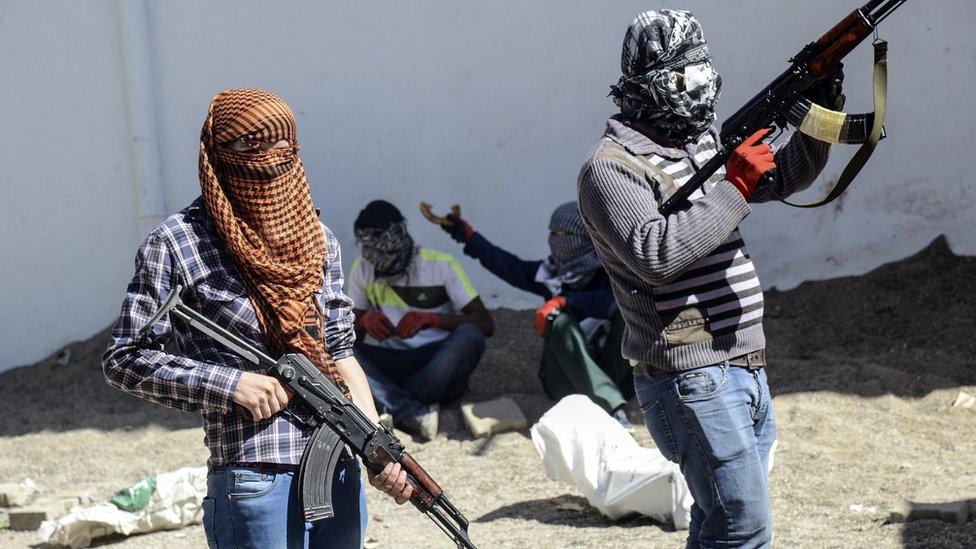
The PKK has announced a new ceasefire to honour the victims in Ankara
However, the ceasefire broke down after the Suruc bombing, with the PKK blaming security services for failing to prevent the attack.
It has since launched a wave of deadly attacks on Turkish security forces, while the Turkish military has pounded PKK positions in both Turkey and northern Iraq.
On Saturday, the PKK announced a new ceasefire to show respect for the victims of the Ankara attacks. But a Turkish security official told the Reuters news agency that military operations against the group would continue.
More than 40,000 people have died since the PKK launched its armed uprising more than 30 years ago.

'Leftist' organisations
Mr Davutoglu also named two militant left-wing organisations as possible suspects - the Revolutionary People's Liberation Party-Front (DHKP-C) and the Marxist-Leninist Communist Party (MLKP).
However, as with the PKK, some observers question whether these groups would target a demonstration that drew in mainly left-wing supporters.
Although neither group has a history of carrying out such large-scale bombings, both have launched attacks in the past, with the DHKP-C targeting US diplomatic missions.
In August, the DHKP-C claimed its members were behind an attack on the US Consulate General in Istanbul. The group previously claimed a 2013 suicide attack on the US embassy in Ankara.
Its members were reportedly among those arrested in a crackdown on suspected IS sympathisers.
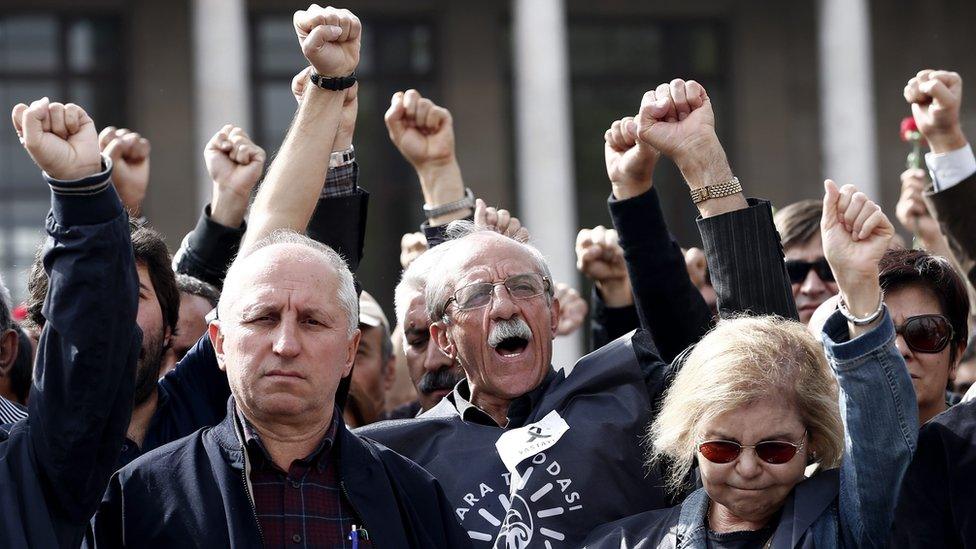
The bombing has raised political tensions in Turkey
The MLKP is a smaller organisation that has been sending volunteers to fight with Kurdish forces in Syria. It claimed responsibility for a 2004 bomb attack on a bus, external in Istanbul that killed three people ahead of a Nato summit in the city.

The 'deep state'
Selahattin Demirtas, the leader of the pro-Kurdish HDP party, said the government had "blood on its hands" after the Ankara bombing. He accused the government of not fully investigating the Suruc bombing or another attack on an HDP election rally in June.
The fact that no police officers appear to have been injured, as well as HDP claims that police officers attacked people carrying the injured to safety, have sparked big debate, according to BBC Turkish reporters.
Suspicions that shadowy nationalist "deep state" organisations could be involved have been further raised by the proximity of parliamentary elections in November.
Ultra-nationalists in the government and security forces have long been suspected of plotting attacks, but President Recep Tayyip Erdogan was thought to have brought their influence to a halt with a series of trials while he was prime minister.
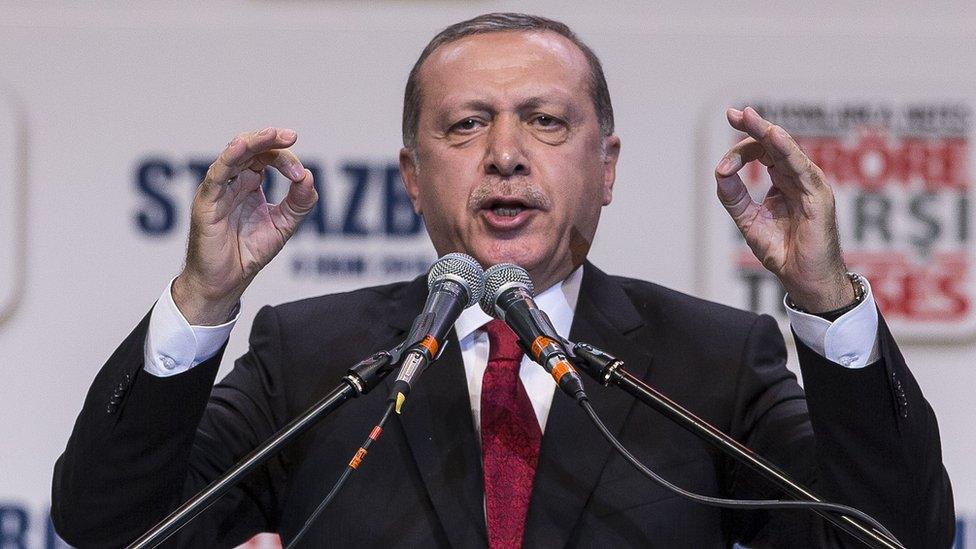
President Erdogan is hoping his AKP party will regain its majority in November
Mr Erdogan himself now hopes the AKP party he founded will regain the overall majority it had held since 2002 but lost during elections in June.
His opponents accuse him of seeking to polarise Turkish society by stoking the conflict with the PKK and creating an atmosphere of chaos to scare voters into backing his party's security-focused platform.
A renewed AKP majority would also enable Erdogan to gather more powers for his presidency.
However, the Ankara bombing has also led to accusations of an intelligence and security failure.
The head of Turkey's Nationalist Movement Party (MHP), Devlet Bahceli, said the country was paying the price for a "sympathetic and warm approach to terror and a biased and non-national approach in foreign policy".
- Published10 October 2015
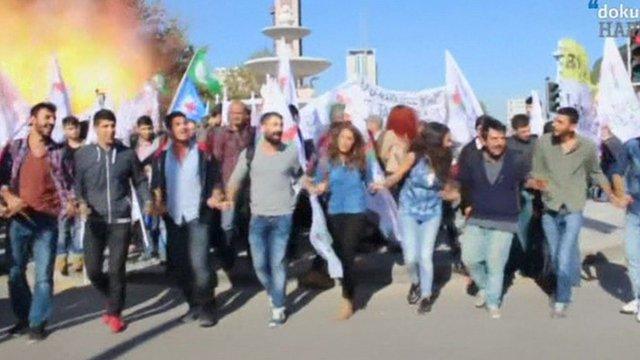
- Published10 October 2015
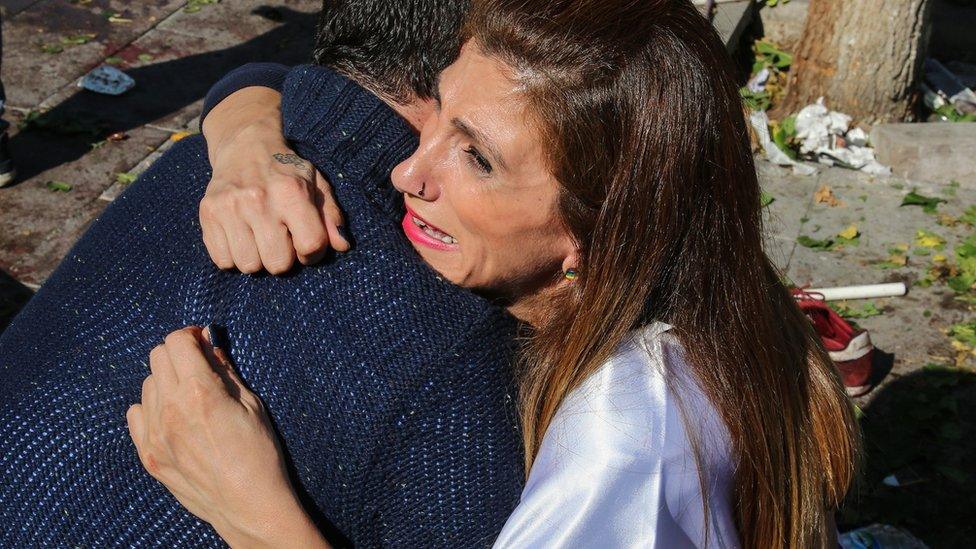
- Published2 December 2015
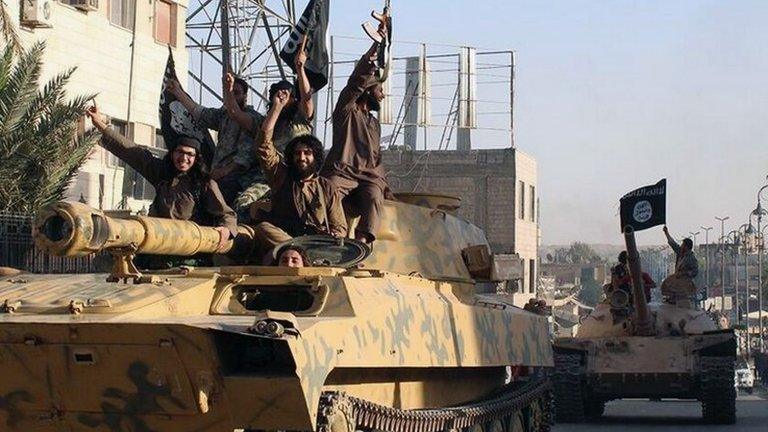
- Published23 August 2016
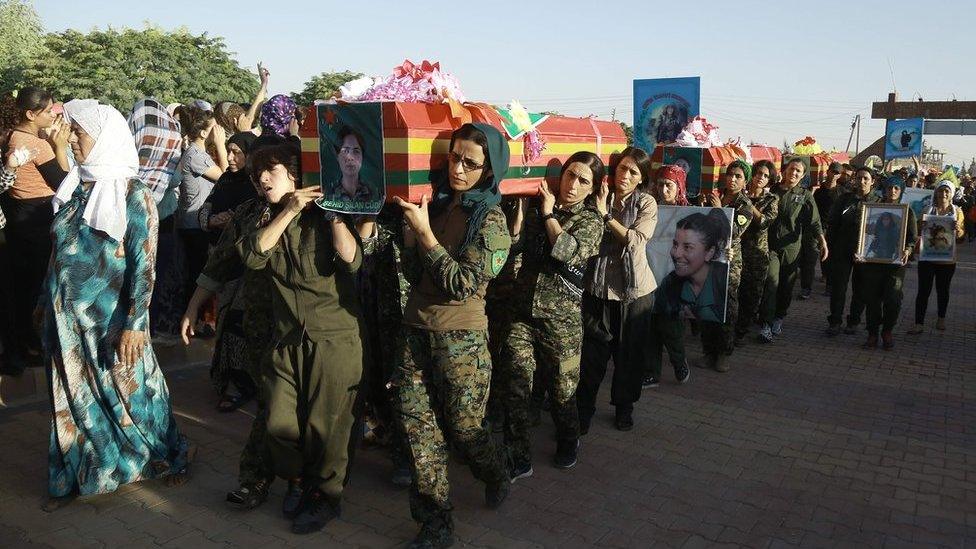
- Published21 July 2015
